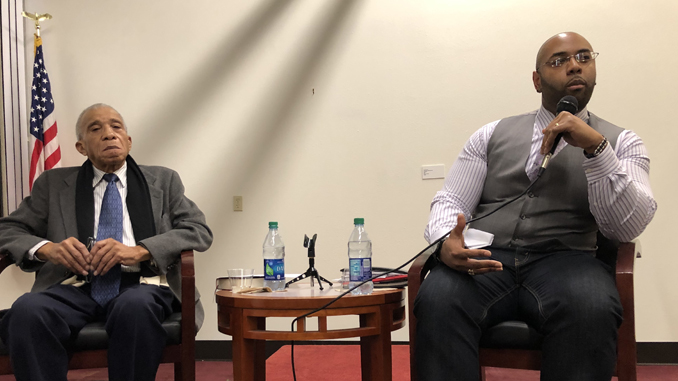
By Avane Ervin
Data News Weekly Contributor
This year marks the 400th year that enslaved Africans arrived in the United States. The slave narratives they left behind provides a history to African-American culture. Retired Dillard University Professor of English and Literary Critic, Jerry W. Ward Jr., and Assistant Professor of English at Xavier University of Louisiana, Jimmy Worthy shared why these slave narratives capture the abilities of African- American ancestors, at a public lecture on Feb. 5, 2019 for the exhibit: “Purchased Lives: The American Slave Trade from 1808 to 1865.”
The travelling exhibit, which coincided with the 2019 National Day of Racial Healing, runs six weeks up to Feb. 28th The third lecture in the series examined “Why does our history matter,” said Robin Vander, an Associate Professor of Literature and African-American and Diaspora studies at Xavier, who coordinated the “Purchased Lives” Public Lecture Series.
On Feb. 19th, the exhibit will host its fifth talk “Family Histories” featuring Genealogists, and the last installment of the lecture series takes place on Feb. 26th on “Reclaiming African-American Legacies and the Human Spirit.” The public series are held on Tuesdays at 6:30 p.m. at Xavier’s Library Nissan Room. The exhibit is provided by the Historic New Orleans Collection and the Louisiana Endowment for the Humanities. Entergy Corporation, the National Park Service, the National Endowment for the Humanities and the Kabacoff Family Foundation also provided support for the exhibit.
“All of our programs are based on the exhibition as a way to allow everyone to understand its importance in the shaping of African-American culture,” Vander added. Both Ward and Worthy, who teach African-American Literature shared how recording slave narratives first started in the Black community.
“Human beings are not hardwired to write,” Worthy said. “We are hardwired to dance, to sing, to have particular interactions with the natural world, but writing allows us to better address the immediate concerns of the political times and environment in which we live,” he added.
Writing has been connected to power, Worthy reminded the audience. It was not a privilege allowed to enslaved peoples. So, for African-Americans to write their lived experiences, they announced then that they too were also human, through the means of being able to read and write, he explained.
“Literacy was the prerequisite for being afforded the rights of human status,” Worthy said. “It is important that we recognize slave narratives as revealing the psychological and emotional scars of negotiating cataclysmic change, and recognize those individuals who offer themselves as renewed,” he added.
The function of slave narratives reveals more than stories of African-American history and their psychological state at the time, but slave narratives also provide a way to examine life after being “property.”
“A sense of ending for them is a sense of beginning for us,” Ward told the audience as he highlighted the influence of African-American literary writers from the past to today. He added that African-American literary figures allowed the public to understand the impacts of living an enslaved life, not just while in bondage, but as freed people still fighting systemic oppression.
“Africans aren’t just like other beings on this planet, they get no special privilege,” Ward said after sharing how he believes that although the History of African-Americans may be an uncomfortable topic for some, the truth of racism should not be watered down.
Both Worthy and Ward believe it is essential for African-Americans to become aware of the history of the culture in order to understand the world around them today.
“You must learn to read differently,” Ward said to the audience. “Not just slave narratives, but you must learn to read the text of the world differently.”
Recommended For You.



Be the first to comment